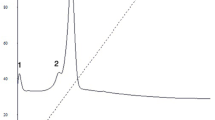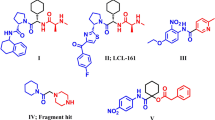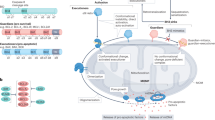Abstract
Δ12-Prostaglandin (PG) J2 is known to elicit an anti-neoplastic effects via apoptosis induction. Previous study showed Δ12-PGJ2-induced apoptosis utilized caspase cascade through cytochrome c-dependent pathways in HeLa cells. In this study, the cellular mechanism of Δ12-PGJ2- induced apoptosis in HeLa cells, specifically, the role of two mitochondrial factors; bcl-2 and apoptosis-inducing factor (AIF) was investigated. Bcl-2 attenuated Δ12-PGJ2-induced caspase activation, loss of mitochondrial transmembrane potential (Δ ψ m), nuclear fragmentation, DNA laddering, and growth curve inhibition for approximately 24 h, but not for longer time. AIF was not released from mitochondria, even if the Δ ψ m was dissipated. One of the earliest events observed in Δ12-PGJ2-induced apoptotic events was dissipation of Δ ψ m, the process known to be inhibited by bcl-2. Pre-treatment of z-VAD- fmk, the pan-caspase inhibitor, resulted in the attenuation of Δ ψ m depolarization in Δ12-PGJ2- induced apoptosis. Up-regulation of Sox-4 protein by Δ12-PGJ2 was observed in HeLa and bcl-2 overexpressing HeLa B4 cell lines. Bcl-2 overexpression did not attenuate the expression of Sox-4 and its expression coincided with other apoptotic events. These results suggest that Δ12-PGJ2 induced Sox-4 expression may activate another upstream caspases excluding the caspase 9-caspase 3 cascade of mitochondrial pathway. These and previous findings together suggest that Δ12-PGJ2-induced apoptosis in HeLa cells is caspase-dependent, AIF-independent events which may be affected by Sox-4 protein expression up-regulated by Δ12-PGJ2.
Similar content being viewed by others
Article PDF
Author information
Authors and Affiliations
Rights and permissions
This is an Open Access article distributed under the terms of the Creative Commons Attribution Non-Commercial License (http://creativecommons.org/licenses/by-nc/3.0/) which permits unrestricted non-commercial use, distribution, and reproduction in any medium, provided the original work is properly cited.
About this article
Cite this article
Kim, BE., Lee, JH., Kim, HS. et al. Involvement of Sox-4 in the cytochrome c-dependent AIF-independent apoptotic pathway in HeLa cells induced by Δ12-prostaglandin J2. Exp Mol Med 36, 444–453 (2004). https://doi.org/10.1038/emm.2004.56
Published:
Issue date:
DOI: https://doi.org/10.1038/emm.2004.56
Keywords
This article is cited by
-
SOX4 inhibits GBM cell growth and induces G0/G1 cell cycle arrest through Akt-p53 axis
BMC Neurology (2014)
-
The role of SRY-related HMG box transcription factor 4 (SOX4) in tumorigenesis and metastasis: friend or foe?
Oncogene (2013)
-
Pleiotropic function of SRY-related HMG box transcription factor 4 in regulation of tumorigenesis
Cellular and Molecular Life Sciences (2013)



